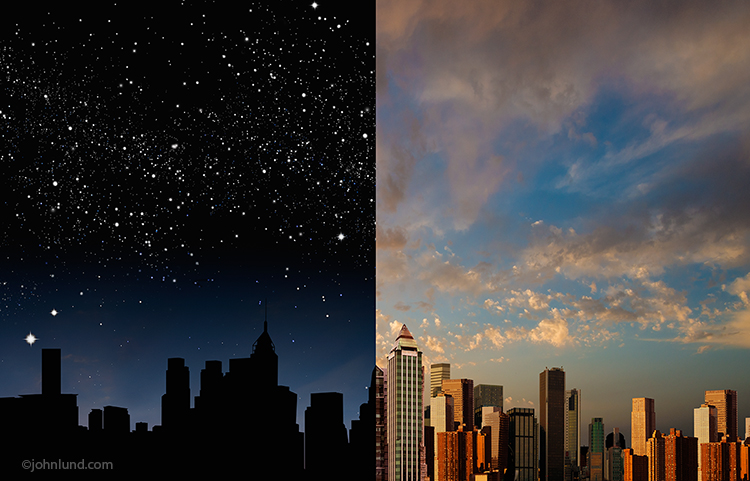Continuing the theme of last week’s post, in which I discussed the opening blessing before the Shema, which speaks of God as “creating all.” This is a euphemism, softening the Bible verse [Isaiah 45.7] that God makes both light and darkness, “makes peace and creates suffering,” or “creates well-being and woe.”
The Talmud [Berakhot 11b] prescribes that in the blessings before Shema, one must “mention the aspect of night during the day and of the day during the night.” Hence, our shaharit prayer praises God as בורא חושך, “creating darkness,” and בורא את הכל (or as the biblically literate would know, בורא רע ) “creating suffering.” The parallel evening prayer maariv praises the One who גולל אור מפני חושך וחושך מפני אור “rolls away the light before the coming darkness, and then the darkness before the next morning’s light.”
One maneuver for making davening meaningful is to ask ourselves: what kind of spiritual experience did the composers and editors of our prayer script try to create? When they prescribed that Jews were supposed to recite these words together in communal worship, what were they trying to make us think and feel?
It seems to me that these particular lines were created to open our consciousness to the rounded, non-dual character of experience. Learn to notice the darkness beneath the sunrise. Remember that bright days always roll into nightfall, and even the darkest night will roll into another dawn. The yin and yang combine in one experience, not two opposed realities.
Not to get too Buddhist about it, but davening these lines points one toward the reality beyond our own sense of what is day and night, in Thich Nhat Hanh’s words: “ultimate reality is free from birth, from dying, from coming, from going.” Perhaps we have an inkling of a Jewish version of the Buddhist noble truth that freedom from suffering comes escaping fixed attachment to what seems merely night or merely day. Adept daveners praise Hashem that both day and night always co-exist at every instant.
An echo of something like that, a hint toward a non-dual consciousness of light and dark, can be heard in the classical Jewish insistence that there are not “two powers in heaven.” The Talmudic Sages – anxious about their various Christian, pagan or Gnostic neighbors –condemned a heresy that would undermine true monotheism. But – back to our berakhah – if there is but One power in heaven, Hashem must be responsible for “light and darkness, well-being and woe.” Not just the good stuff.
R. Itzhak Abuhav [1433-1493], himself exiled from Spain, gave voice to this consciousness: “If we did not mention the night during our morning prayers, it would appear as if we thought darkness was bad. But this is not so. For God created all things beautiful in their proper place [Ecclesiastes 3.11].” I imagine R. Abuhav davening with this in mind, as he himself recited shaharit on the morning in the summer of 1492, as he fled from Castille to Portugal.





